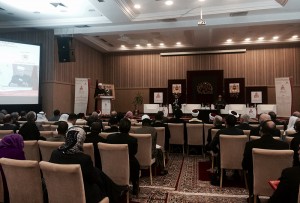The Washington Post
By Aida Alami | Religion News Service
Photo by Aida Alami

After the Prophet Muhammad established the first Muslim state, he wrote the Charter of Medina to make sure his subjects lived in harmony, whether they were Muslims, Jews or people of other faiths.
Nearly 1,400 years later, hundreds of religious scholars met in Marrakesh in a bid to revive the charter to protect religious minorities in Muslim communities today.
The scholars recognize a worldwide crisis: The so-called Islamic State is killing Christians, Yazidis and others and imposing its harsh orthodoxy on millions in Iraq, Syria and elsewhere in the Middle East and North Africa. Tensions between Sunni and Shiite leaders throughout the region are escalating, too.
Sponsored by Moroccan King Mohammed VI and the United Arab Emirates-based Forum for Promoting Peace in Muslim Societies, the Jan. 25-27 conference included 300 prominent Islamic clerics and experts from Morocco to Indonesia.
Participants called for more tolerance for minorities and unveiled the Marrakesh Declaration, an updated bill of rights for religious minorities, inspired by the Charter of Medina.
The goal was to prepare clerics, judges and others to return home and sensitize their communities about the Prophet Muhammad’s message of peace, said attendee Mohamed Elsanousi, the Washington, D.C., director of the Network for Religious and Traditional Peacemakers.
“Freedom of religion is inscribed in the Quran,” Elsanousi said. “’We need to get the message out and refute the ideas that Daesh (or the Islamic State) and al-Qaida are spreading.”
Conference participants included Iranian muftis, Pakistani judges and other Muslim authorities.
“Enough bloodshed,” said Abdallah bin Bayyah, a Mauritanian religious scholar and professor of Islamic studies based in Saudi Arabia. “There is a sickness right now in the world but we have treatments for it within Islam.”
Some participants pointed to Morocco as a successful example of tolerance and hoped it could serve as a model for other Muslim countries: Moroccan law specifically protects its Jewish population of around 6,000 people, according to 2010 estimates.
Keep Reading vv
“We in the kingdom of Morocco will not tolerate the violation of the rights of religious minorities in the name of Islam,” said King Mohammed VI in an opening statement read by the minister of religious affairs, Ahmed Toufiq. “I am enabling Christians and Jews to practice their faith and not just as minorities. They even serve in the government.”
Andre Azoulay, a Jewish adviser to King Mohammed, said the conference was a small but important step in changing attitudes as well as government policies.
“The exercise is not just academic,” he said in a phone interview. “Many are siding with diversity and are resisting going backward. A lot is at stake: There are many risks and challenges but also much promise.”
Azoulay said he has never felt like a minority in Morocco, a country where the monarch’s grandfather — King Mohammed V — didn’t surrender its Jews during World War II when it was controlled by France’s pro-Nazi Vichy government.
Mohamed Magid, executive imam of the All Dulles Area Muslim Society, a mosque in northern Virginia, said that it is necessary for religious minorities to be treated well in Muslim countries but also that the world needs to be aware of the rise of Islamophobia, too.
“We have a lot of kids that are bullied at school,” he said.
“The threat is serious all over the world,” added Magid. “We have to stop it and we also have to take pre-emptive measures. I look forward to the implementation of the declaration at a grass-roots level.”
But others cautioned that a three-day conference wouldn’t solve the profound problems facing the Muslim world.
Farid Esack, president of the International Quranic Studies Association in South Africa and a professor of Islamic studies at the University of Johannesburg, said profound political and theological reforms need to take place to change how Muslims treat minorities. He didn’t believe the conference would accomplish much.
“This issue has become an issue of huge embarrassment for Muslim governments,” said Esack, who did not attend the conference and spoke via a phone interview. “But the embarrassment factor isn’t sufficient enough to address the problem. Religious minorities lead horrendous lives of marginalization and persecution.”
The positions taken by clerics wouldn’t impact most Muslims, he added, because most religious authorities in Muslim countries are more concerned with supporting their governments than engaging in dialogue.
And while Morocco may be held up as a model for the region, Moroccan converts to Christianity live in secrecy out of fear of punishment from the authorities. It is illegal to attempt to convert Muslims to other faiths, and those who do convert often face prejudice.
Christians worship in private homes and secret congregations exist where Christian converts gather to practice their faith, said conference attendee Anne Marie Teeuwissen, 63, a Protestant French citizen who has lived in Morocco for more than 30 years and is married to a Moroccan man.
Refusing to convert to Islam disadvantages her, she said. Under Moroccan law, she cannot inherit her husband’s assets, and her children cannot inherit anything from her.
“When spouses of Muslim Moroccans are naturalized, there is a pressure for them to convert to Islam,” she said. “I chose to not convert, and I am accepting the consequences.”







